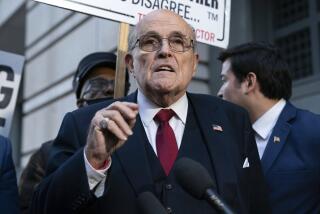Connecticut Tries to Cancel Bridgeport’s Bankruptcy : Cities: State fears action by its biggest muncipality could harm whole area’s credit. Banks won’t cash public workers’ paychecks.
- Share via
BRIDGEPORT, Conn. — Connecticut state officials moved swiftly Friday to try to cancel a bankruptcy filing by the city of Bridgeport, fearing that the desperate action by the city might harm the entire state’s credit rating.
The bankruptcy filing threw the city into disarray as municipal employees discovered that local banks would not cash their paychecks and tradesmen and suppliers besieged City Hall with queries about whether contracts would be honored and bills paid.
Bridgeport, Connecticut’s largest city, on Thursday earned the dubious distinction of becoming the biggest municipality in U.S. history to file for bankruptcy. The mayor of this city of 142,000 had threatened a bankruptcy filing earlier this year, but received a stern warning from state officials and bond ratings agencies. But she surprised the state and some members of her own City Council when she called an emergency council meeting late Thursday to announce that a bankruptcy petition had indeed been filed.
The mayor said the petition was filed because the city could not stand the massive layoffs of police and an 18% property tax hike needed to fill a $12-million budget gap. In a document filed with the bankruptcy court, the city said it was filing a plan to restructure its debts “to save it from unbearable consequences.”
But a state financial review board that has been overseeing Bridgeport’s troubled finances since 1988 said the mayor’s action was illegal. In a meeting in City Hall, board members said the city is not really insolvent, and said the mayor had no authority to act without its approval. The board authorized State Atty. Gen. Richard Blumenthal to challenge the petition in federal bankruptcy court. A spokesman for Connecticut Gov. Lowell P. Weicker Jr. also said the filing was illegal.
Donald Kirschbaum, the financial review board’s executive director, said: “The message we need to send is that as far as this state and board are concerned, the city of Bridgeport will not proceed with this bankruptcy filing.”
Municipal bond experts said bankruptcy by a major city easily could spill over to affect Connecticut’s finances, much as New York City’s flirtation with insolvency in the 1970s wreaked havoc on New York state’s.
Bridgeport is one of many cities, particularly in the Northeast, that have been wrestling with severe economic crises that became particularly pronounced when the national recession set in. Bridgeport, on the shore of Long Island Sound, has been in economic decline for years as the heavy industry that supported it shut down or moved away.
Like other blighted cities, such as Philadelphia and Detroit, it has suffered a severe erosion of its tax base as middle-class citizens moved to the suburbs. The city is now dotted with closed factories and many of its residents live in severely deteriorating public housing. Last year, it had the highest murder rate in the state.
James E. Tansley, president of Bridgeport’s City Council, said the city decided to file for bankruptcy because it saw no prospect of getting significant aid from the state. “Suburbia runs the Legislature,” he said. He predicted that other severely troubled Connecticut cities such as Hartford and New Haven may eventually be forced to follow Bridgeport into bankruptcy court.
So many businesses have left the city that about 60% of the property tax is paid by homeowners, an exceptionally high proportion, Tansley said. With unemployment high and local property values collapsing, few residents feel they can put up with another steep hike in taxes.
The financial review board had said it would hike city property taxes 18%, another in a line of several large increases that have been imposed since it began overseeing the city’s finances. Kathy Burk, executive director of a business advisory committee to the city, said that if taxes rise further, “Our people are just going to put the keys in the mailbox and walk away.”
City officials claimed the budget-cuts the review board threatened would have meant layoffs of up to 100 of the city’s 340-member police force. The city’s own efforts to trim its budget resulted in a proposed 1991-92 budget that called for closing most city parks and cutting the city’s library budget by 50%. They claimed that even if the review board’s budget and tax hike were adopted, the city would still face a $55-million deficit the following year.
Bankruptcy filings by cities are extremely rare. They are authorized under Chapter 9 of the federal bankruptcy code, but cities normally seek to avoid it at all costs, in part because it might permanently damage their ability to raise money by selling bonds or short-term notes. Bankruptcy experts said there were fewer than 70 Chapter 9 petitions filed from 1980-1990, mainly by municipal utilities. Fewer than 10 of those were by cities, villages or counties.
The credit ratings agencies Moody’s and Standard & Poor’s immediately suspended their ratings on about $200 million of the municipal bonds Bridgeport has outstanding. Joan Dougherty, a Moody’s official, said no attempt would be made to rate the bonds until the status of the city’s bankruptcy filing is cleared up in court. But, she said: “We take it very seriously when a mayor of a large municipality wants to pursue a bankruptcy filing.”
The ratings agencies took no immediate action to review Connecticut State’s bond ratings.
Mayor Moran is a Republican, and Democrats on Bridgeport’s City Council opposed the bankruptcy filing, as did members of city employee unions. Ronald Mackey, a Bridgeport fireman, said he believed the mayor filed for bankruptcy in part because she was not satisfied with concessions offered by the unions.
Friday was payday for Bridgeport employees. Dante Boccarossa, a heavy equipment operator, said he checked with his bank at noon and was told that it was not honoring city checks. But in a press conference later in the day Moran claimed that banks will again honor the checks and the city would keep paying its bills.
More to Read
Sign up for Essential California
The most important California stories and recommendations in your inbox every morning.
You may occasionally receive promotional content from the Los Angeles Times.













